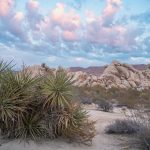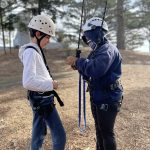Outward Bound was founded with four core values: excellence, service, integrity and diversity & inclusion.
While diversity and inclusion have been written into our curriculum since day one, we know that the outdoor industry has been and is still deeply rooted in predominantly white, heteronormative culture. We can see this through the wilderness areas in which we travel, many of which are stolen lands from native peoples. We can see this in the lack of representation in our staff and throughout our industry for our students of color and other non-dominant identities.
At OBCA, we are working hard to change these parts of our organization. We are asking our staff to step into this work to identify personal and implicit bias. We are examining our organizational structures to recognize where change is needed to be a truly inclusive space. And we are still learning.
During a time in our world when xenophobia has been placed on an international stage through discriminatory and harmful reactions to the coronavirus pandemic, we are asking our community to lean into our value of diversity and inclusion. The vision of Outward Bound is to create a more compassionate and resilient world through creating more compassionate and resilient individuals. And in this fight against xenophobia, we are all needed. Look out for each other, do the brave thing and put compassion first.
A few action items (including several shared by The San Francisco Foundation) include:
-
Read these Safety Tips for Those Experiencing or Witnessing Hate
-
Check out A Brief Timeline of Racism Against Asians in America
-
Watch the 2020 PBS series, Asian Americans
-
Download the Asian American Racial Justice Toolkit
-
Read a book on Asian American history from Eastwind Books in Berkeley
-
Shop at Asian American-owned businesses or in Asian business districts
We recognize that we at OBCA are very much still learning how to be active accomplices in the fight for racial justice and are invested in continuing to do better as an organization to collaborate with community leaders as agents of change.
One of our staff members has shared her experiences as an Asian American during this time.
Being Asian [&] American
No matter how hard I tried to rid my accent, to talk “properly,” and to “be American,” I will always be seen as a foreigner, despite being born and raised in this country. Xenophobic and racist comments are not new for me:
Where are you really from?
Wow, your English is so good.
You must be really good at math and science.
They followed me through my childhood, adolescence, and adulthood. They followed me from the East Coast to the West Coast, from the United States to Hong Kong.
You’re American? But you’re not White.
Currently, I am living in El Salvador until Outward Bound programming can begin again. Before the country went on lockdown, I was constantly stared at because of my race. (There aren’t many Asians here.) Then, it was harmless. I knew I wasn’t going to be deported because of my ethnicity or my nationality.
Now, I live here in fear. People are being arrested and detained in fear of having the virus. Those who came from epicenters, like the US or Europe, are quarantined. I’m scared when I open the door to get our water, when internet technicians come to our house, and if we say anything on the neighborhood group chat.
One look at me, and it’s assumed my nationality is Chinese, where the virus started. One look at my passport, and it’s confirmed my nationality is American, where the epicenter is. Lose-lose.
What if they call the government on us? They know we’re foreigners.
Coronavirus is bringing to light xenophobia – from media misrepresentation to violence against Asian diasporas around the world.
News flash: this is not a new experience for me. And it’s SO complicated.
There are so many layers that need to be unpacked.
As a person of the global majority, how do I undo years of internalized oppression? How do I stop seeing myself as less than my White peers?
As an American, how do I perpetuate xenophobia and other racist stereotypes? What does it mean to be inclusive through policies and practices?
As a community, how do we respond to racism? How do we learn more about other cultures? How do we call out oppression and racism when we see it? How do we move from being inclusive and tolerant to liberating?
Xenophobia and racism will not disappear overnight. There is no easy fix.
There is, however, inclusive community – whether in-person or online, in the backcountry or in our respective homes. Social distancing doesn’t mean being socially distant from each other. Self-education can happen on your couch. Conversations can happen despite being physically apart.
Coronavirus is bringing to light various issues that’ve been ignored for centuries, not just xenophobia. The question is: what are you going to do about it?
Here are some ideas to get you started:
- Learn about xenophobia/racism in the United States and its history through resources online or in the library.
- Reflect on how you perpetuate oppression because we all do. Be okay with questions without answers.
- Speak up against racist comments, including microaggressions. You are our best allies. We are not in your circle of friends or family dinners. And if we are, it is emotionally draining to constantly educate others about our experiences.
I don’t have many answers. In fact, I still have uncomfortable questions. And that’s okay.
If I’m honest and allow myself to be uncomfortable, I am terrified to return to the United States after the pandemic subsides. Will I be called racial slurs again? Will I be told to go back to my country? Will I be spit on or harassed while out in society?
I don’t know, but I know I can take care of myself mentally and emotionally during this time. I have a community of trusting friends and coworkers to talk to and process with. I have activities that bring me joy. I limit my social media and news content but I am still informed of the world around me. This is a difficult time, but I know that when we put love first, we can get through this.
Sushi Au (she/her/they/them) is a first-generation American, first-born to a Vietnam refugee and Chinese migrant. Despite her parents’ dismay, she pursued social work and found herself in the world of social justice. After serving with domestic migrant workers in Hong Kong, they came to Outward Bound California first as a Program Intern in the Bay Area then Logistics Coordinator in the High Sierra. Doing what she can, Sushi hopes to help make outdoor space and activities inclusive for everyone.
When not moving around or out in the wild, Sushi contemplates intersectionalities of identities, social justice and love, how to support NGOs with their passion for design, ways to leave the world a better place, how vests function, and what peak to climb/hike/backpack next.










